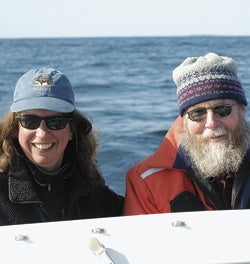Amy Knowlton, M.M.A. ’97

Entanglement and Other Issues
One thing’s for sure about working with right whales: it’s no boring desk job. Just ask Amy Knowlton of the New England Aquarium.
In 1987 Knowlton was conducting an aerial survey for North Atlantic right whales off the Georgia coast when the twin-engine plane ran out of fuel and crashed into the ocean. Her account of her escape and rescue was featured on the PBS science program NOVA.
Then there was the time her team was attempting to measure a whale’s blubber using an ultrasound device. North Atlantic right whales weigh about 70 tons and can reach 50 feet in length, and this one didn’t care to be studied. “The whale did a 180o turn and came up under our vessel and slammed it,” she recalled. “I got catapulted off. Luckily I had a float jacket on.”
The rewards involved in preserving these great creatures are worth the risks, she says. As a research scientist with the aquarium’s Right Whale Research Project, Knowlton studies one of the world’s most endangered large whale species. Fewer than 500 North Atlantic right whales survive in the coastal waters of North America. Human impact—in the form of vessel strikes and entanglements in fishing gear—accounts for about half of all right whale deaths.
Knowlton recently returned from two months on the water in the Bay of Fundy, where each year in late summer her team monitors the right whale population as part of a decades-long study. She started on the project right out of college.
Her graduate studies in marine policy at URI helped her to play a role in a successful effort to convince the federal government to place seasonal speed restrictions on ships in the whales’ habitats.
Her current focus, the entanglement issue, reflects the enduring struggle between humans and the natural world: “I’m trying to help us coexist.”
Get more information about right whales and the Right Whale Research Project.
—Mark Sullivan
 Home
Home Browse
Browse Close
Close Events
Events Maps
Maps Email
Email Brightspace
Brightspace eCampus
eCampus


